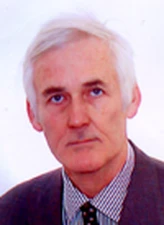Julian C. R. Hunt

The 2001 Lewis Fry Richardson Medal is awarded to Julian C. R. Hunt for his fundamental contributions to the understanding of turbulent and stratified flows and dispersion modelling and their applications in environmental fluid dynamics.
In his career and his research work, Julian Hunt has contributed to several types of scientific areas of science, as did other winners of this medal and of course L.F. Richardson himself. After graduating in engineering at Cambridge, he worked on his Ph.D. at Cambridge and Warwick universities on theoretical and experimental aspects of magnetohydrodynamic flow and stability (disproving the work of several senior scientists doing so), for which he was awarded a competitive prize Fellowship of Trinity College, Cambridge. He continued this research as a Fullbright Fellow visiting at Cornell University, U.S.A. in 1967. On returning to the Central Electricity Research Laboratories in the U.K. he was encouraged to pursue fundamental studies of practical problems in turbulence and environmental fluid mechanics. He moved to Cambridge in 1970 in order to pursue these new approaches in more depth and apply them more widely.
Under the influence of the Cambridge fluid mechanics ‘school’ of G.I. Taylor, G.K. Batchelor and A.A. Townsend, Hunt and his colleagues steadily developed over 30 years a generalisation of the homogeneous turbulence theory to the statistical description and simulation of the linear and weakly non-linear dynamics of eddies in the main types of complex turbulence found in geophysical and engineering flows. Essentially his approach was to analyse the main inhomogeneous and anisotropic effects of boundary conditions and body forces by quasi-linear models while approximating the non-linear effects by homogeneous relaxation processes. This has let to comprehensive understanding and formulae for the spectra and correlation, in the atmospheric boundary layer as the conditions vary between convective to stably stratified and the flow is distorted by buildings, hills, or water waves.
With Dr Vassilicos he showed how the classical statistical results approach could be interpreted in terms of turbulent eddies (using the appropriate techniques of fractal analysis) and thence applied to improving our understanding and modelling of scalar mixing and diffusion. After the late 1980’s, his career and scientific interests increased in scale, when he founded Cambridge Environmental Research Consultants Ltd., he was the first secretary general of ERCOFTAC (new European network for collaborative research work on Flow, Turbulence and Combustion) and took on the job of running 3,500 people at the Meteorological Office. There he developed new interests in the fundamentals of weather and climate prediction, and he oversaw the 40% improvement in the accuracy of tropical cyclone forecasts. With colleagues in Europe and USA, he helped apply quasi-linear analysis to non-linear synoptic scale problems by showing how the dynamics of atmospheric vortices can determine the predictability of large scale systems and how very sensitive Coriolis effects in stable flows can control weather patterns over 1000 kms around mountainous areas, and along coastlines.
Currently Julian Hunt is a Professor of Climate Modelling at University College London. He is also a Fellow of the Royal Society. He was involved in political activities in the U.S.A. in 1967, on Cambridge City Council in the 1970’s and is now a Labour peer in the House of Lords (a part time job with some high scientific content).
